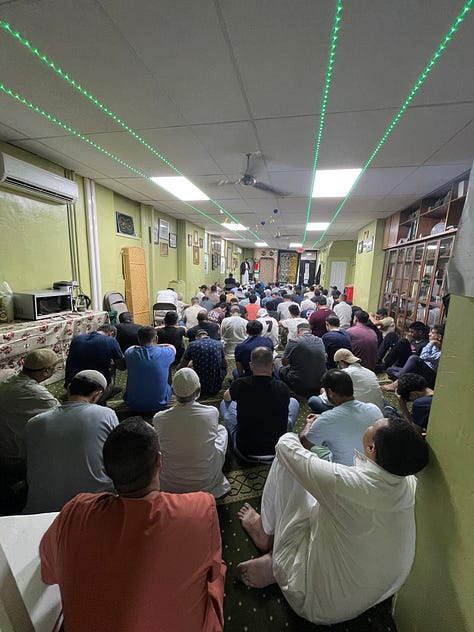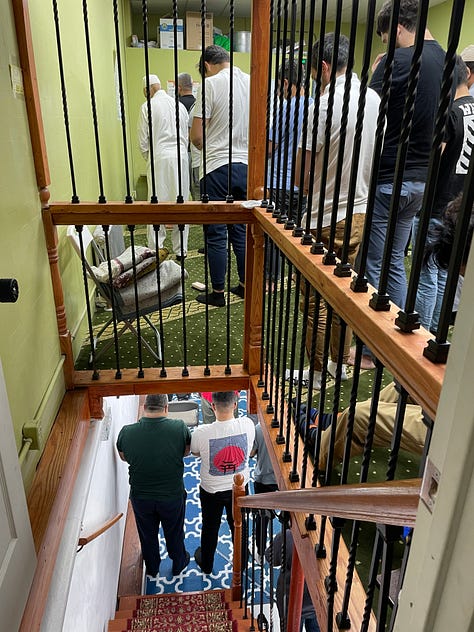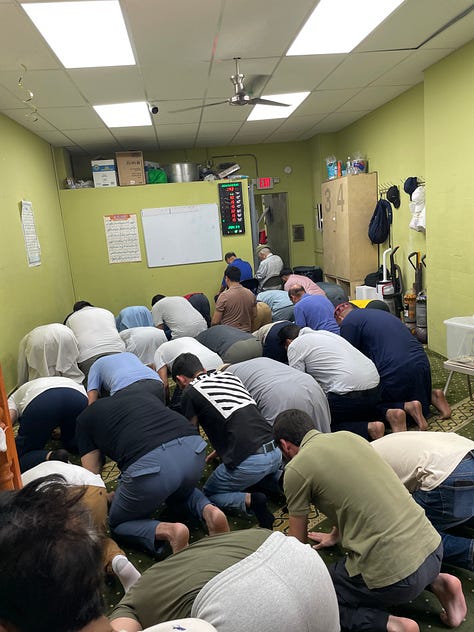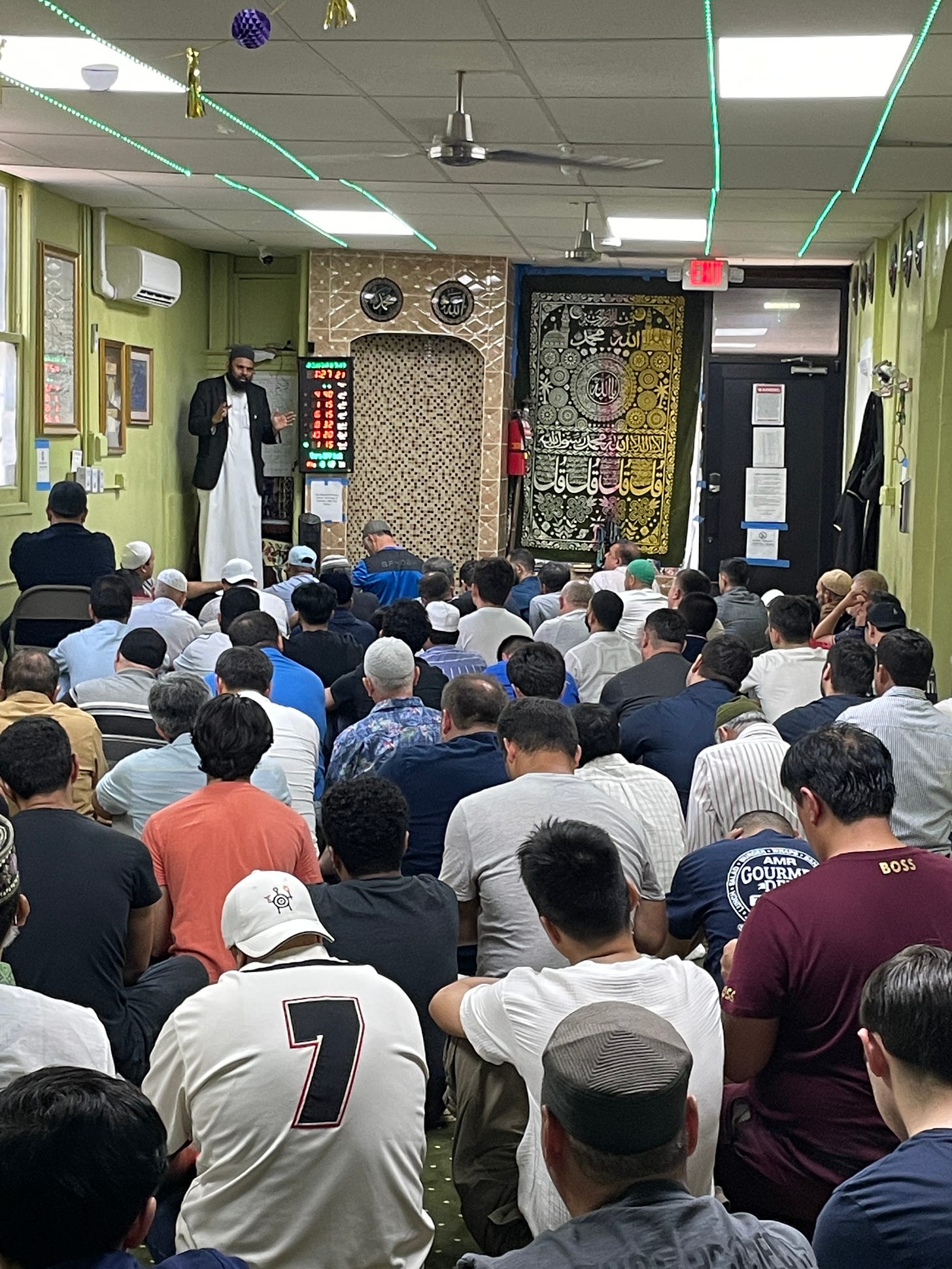Hello - I usually post on Thursdays, but this has been a very busy week for me and I didn’t want to wait until next Thursday to post this. The next post will be published on a Thursday.
It is Friday prayers at the Iqra Masjid Community and Tradition in Bensonhurst. Starting around 1pm, men file into the small spaces which include three floors - upstairs, ground floor, and downstairs. The ground floor is split into two rooms, one in the back and one in the front right near where shoes are stored as it is done in all Muslim prayer spaces. As more and more men show up, there is less room, and soon prayer rugs are passed outside for the Muslims taking part in the Friday prayers.
All in all, between 300 to 400 men are taking part in the prayer service. Some took off from work to get to this Masjid. School-aged boys left school early and were picked up by their parents or others they knew. It is the opportunity for a Masjid to come together during what Muslims call, Salah al-Jumu’a, the Congregational or communal prayer service held on Fridays. Many work together to make this congregation happen, and when seen from a wider perspective, it captures the hard work this Masjid is doing both for its Islamic faith and this particular house of worship.
One noticeable thing during this Friday service is that no women are present throughout the Masjid. One man, who is directing attendants where to go to find space for prayers, akin to an usher, says Muslim women are not obligated to take part in Friday communal prayers; they can pray at home instead. But if they do want to attend in-person, they are allowed.
Another reason is, that there is simply not enough room at this Masjid, particularly with some men spilling into the sidewalk outside. But then again, this community is relieved to have this space at all.



Iqra Masjid began in 1996 as a mostly Turkish congregation near Quentin Road and McDonald Avenue. It gathered in a one-bedroom apartment before growing large enough for a more solid location. Eventually, the Masjid came to 2483 65th Street on a commercial block near Avenue P in June 2022.
“This building was bought for $1.5 million and now we have a debt,” says Imam Ahmed Ali, referring to how the Masjid owes over $1 million, as mentioned on its website. “We have to pay $9,000 monthly. Of course, we’re not a business but it has to be paid off as soon as possible.”
Despite not being a business, the Iqra Masjid secured an LLC to help pay what it owes; Imam Ali says it was a lengthy process. The Masjid’s website and social media accounts tells members about the monthly payments and encourage donations. During the Friday prayers, as members make their way in, some slip dollar bills in a donation bin or scan donations via an app on their phones.
During the service, Imam Ali talks about life after death and asks those in attendance what the real plan in life is. “Salah is the key to paradise,” he says.
He also mentions how important it is to welcome everyone at Iqra Masjid and doing so is the best example as Muslims. Although most in attendance follow Sunni Muslim, a few are Shia.
“Everybody is welcome,” says Sheebaz Bhatti, a member of the masjid. “Some don’t want to pray with others. But there’s an open mind here. Islam is one. I won’t go into any mosque with any division.”
Another imam, also named Ahmed, explains while some mosques and masjids are mostly of one ethnic group, at Iqra Masjid, there are Persians, Arabs, Pakistanis, and people from the former Soviet Union, thus making up the diversity of this part of Bensonhurst.
“It’s the closest for everybody,” he says.
Imam Ali emphasizes how at this masjid, everyone looks out for each other and it is a tight community. “When someone needs help, we try one person at a time.”
That goes for not just Muslims, but everyone in the neighborhood. The Masjid distributes food to those in need and those who are lined up are not part of the Iqra Masjid.
At the end of the service, the Imam introduces some boys from high school and middle school. The parents of one are doing the hajj, the obligation for Muslims to make the pilgrimage to Mecca. Another has been studying Arabic at Iqra over the last six months and now says he can understand and read it.
There are three teachers who volunteer to teach the children the Qu’ran and Arabic, and all three are women.
“In Islam, women have more privileges than men,” Imam Ali says. “As it says, ‘paradise lies down under the feet of mothers.’ Their rights are more secured.”
Women can come here to study Islam and its holy texts throughout the week, but when it comes to prayers, most go to a nearby mosque with more space.
“We don’t have a place to accommodate them,” says Mohammed Afzan, a member of the Masjid. “But we try to accommodate for them if they come [for prayers].”
Looking out for each other is what the people at Iqra Masjid do; Imam Ali explains how everyone is treated like each other’s family members. Looking out for the Masjid, the building is also a responsibility for all. Some vacuum each day, and clean the bathrooms, and even washrooms where Muslims wash their hands, feet, and faces three times as part of the ablution before prayer.
The Iqra Masjid Community and Tradition is a tight-knit community where everyone looks out for each other. They also have to look out for their physical Masjid as they do what they can to help pay off the debt owed. It is their duty as Muslims to do so.
“Once you start a mosque,” Imam Ali says. “It is the responsibility of all Muslims to keep it. We have the building now, so we’re going to stay. This is a house of God.”








